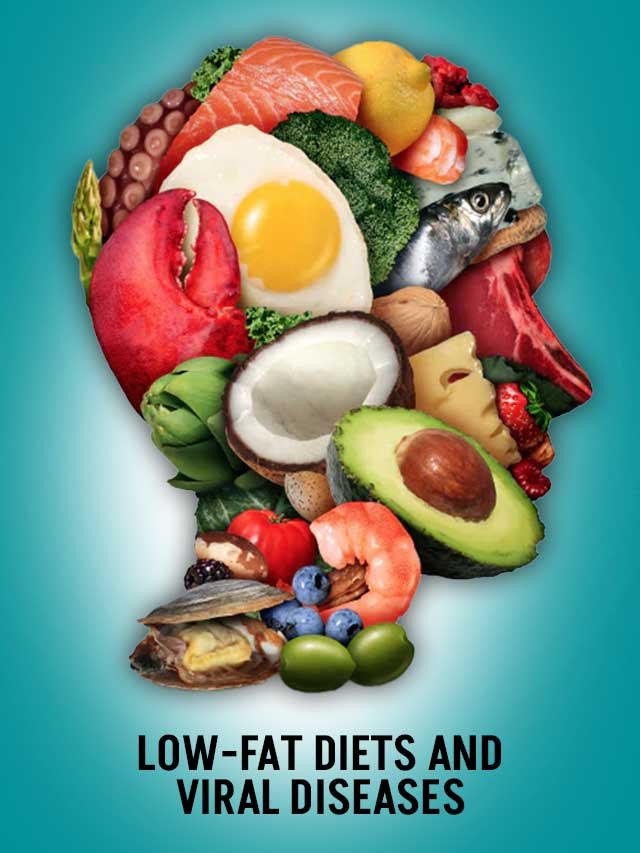HEALTH NEWS
Link Between Low-Fat Diets and Viral Diseases: A Comprehensive Exploration
-
 Rahul Priydarss
Rahul Priydarss - January 24, 2024

B
efore exploring the connection between low-fat diets and viral diseases, it’s essential to grasp how nutrition impacts our immune system.
Table of Contents
Introduction:
In recent times, the relationship between diet and health has become increasingly evident. One particular area of interest is the impact of low-fat diets on susceptibility to viral diseases. As we navigate through the complexities of maintaining a healthy lifestyle, understanding how dietary choices influence our immune system is crucial. In this article, we delve into the intricacies of low-fat diets and their potential role in preventing or exacerbating viral diseases.
The Immune System and Nutrition:
Before exploring the connection between low-fat diets and viral diseases, it’s essential to grasp how nutrition impacts our immune system. A well-balanced diet is pivotal in supporting immune function and helping our bodies fend off infections and diseases. Key nutrients such as vitamins C and E, zinc, and omega-3 fatty acids are known for their immune-boosting properties.
The Low-Fat Diets Trend:
Low-fat diets gained popularity in the late 20th century as a response to rising concerns about heart health. The idea was to reduce the intake of saturated fats, believed to contribute to cardiovascular issues. Consequently, many individuals adopted low-fat diets, focusing on lean proteins, whole grains, and fruits and vegetables while minimizing the consumption of fats, especially saturated fats.
Impact on Immune Function:
While low-fat diets were primarily embraced for heart health, researchers have begun to investigate their broader implications, including their potential influence on the immune system. Some studies suggest that a deficiency in certain fats, particularly essential fatty acids, might compromise immune function. Essential fatty acids, such as omega-3s, play a crucial role in building cell membranes and regulating inflammation, both of which are integral to immune responses.
Viral Diseases and Immune Response:
When it comes to viral diseases, a robust immune response is imperative for prevention and recovery. Viruses exploit host cells to replicate, and a vigilant immune system is our primary defence. An imbalance in nutrient intake, including fats, can affect the immune response and potentially impact our ability to combat viral infections.
Omega-3 Fatty Acids and Viral Defense:
Omega-3 fatty acids, commonly found in fatty fish, flaxseeds, and walnuts, have been studied extensively for their anti-inflammatory properties. Some research suggests that these fatty acids may enhance the body’s antiviral defences by modulating immune responses. Including sources of omega-3s in a low-fat diet could be a strategic approach to maintaining a balance between reducing unhealthy fats and supporting immune function. and we recommend use Amway Salmon Omega-3.
Potential Pitfalls of Excessive Fat Restriction:
While reducing saturated fats is generally beneficial, an overly restrictive low-fat diet may lead to unintended consequences. Fats are essential for absorbing fat-soluble vitamins (A, D, E, and K), and a deficiency in these vitamins can compromise overall health, including immune function. Striking the right balance between reducing unhealthy fats and ensuring an adequate intake of essential nutrients is key.

Future Research and Development on Low-Fat Diets:
- Ongoing Research in the Field of Diet and Its Impact on Viral Diseases: Continued research in the field of diet and its impact on viral diseases promises further insights. This section explores potential advancements and emerging developments in understanding the relationship. Trend Impact on the Food Industry
- Influence of Low-Fat Diet Trends on Food Manufacturing and Marketing: The influence of low-fat diet trends extends beyond individual choices, impacting the food industry. The availability of low-fat options in the market reflects the consumer demand for healthier alternatives. Long-term Effects and Sustainability
- Examining the Sustainability of Long-term Adherence to Low-Fat Diets: While the short-term benefits of low-fat diets are evident, examining the sustainability of long-term adherence is crucial. Understanding potential long-term effects on health and well-being provides a holistic perspective.
FAQs (Frequently Asked Questions):
Q- Do low-fat diets weaken the immune system?
A- No, when balanced appropriately, low-fat diets can support a robust immune system.
Q- Can I follow a low-fat diet if I have dietary restrictions or preferences?
A- Yes, low-fat diets can be adapted to various dietary needs, but it’s essential to ensure nutritional adequacy.
Q- Are all fats harmful, as some myths suggest?
A- No, essential fats are crucial for various bodily functions, and a balanced approach is key.
Q- How quickly can one expect to see results on a low-fat diet?
A- Results vary, and factors like metabolism and lifestyle play a role. Patience is key.
Q- Is it necessary to eliminate fats for a low-fat diet to be effective?
A- No, a low-fat diet involves reducing unhealthy fats while maintaining a balance with essential fats for optimal health.
Review:
– Insightful Exploration of Dietary Trends
– This article provides a comprehensive look into the connection between low-fat diets and viral diseases. The breakdown of misconceptions, impact on health, and real-life stories make it an insightful read for anyone considering a dietary shift. The inclusion of FAQs adds a practical touch, addressing common queries effectively.
– Balanced Perspective on Low-Fat Diets-
A well-balanced overview of the pros and cons of low-fat diets. The article not only explores the potential benefits of weight management but also dives into the impact on the immune system. Real-life success stories and practical tips add a human touch, making it a valuable resource for those seeking a holistic understanding.
– Informative and Engaging
– This article seamlessly combines scientific insights with a conversational tone, making it both informative and engaging. From dissecting the immune system’s role to addressing controversies, the content is well-structured. The inclusion of FAQs and a conclusion further enhances its value, leaving readers well-informed and ready to make informed dietary choices.

-Remember, Always consult with healthcare professionals or Doctors for personalised advice related to medical conditions.
Conclusion:
In conclusion, the intricate connection between low-fat diets and viral diseases unveils a complex interplay between diet, immune function, and overall health. While low-fat diets offer potential benefits, a balanced and informed approach to dietary choices remains paramount. Understanding the individualized nature of health and consulting healthcare professionals ensures a holistic and sustainable approach to well-being.
Previous Post





